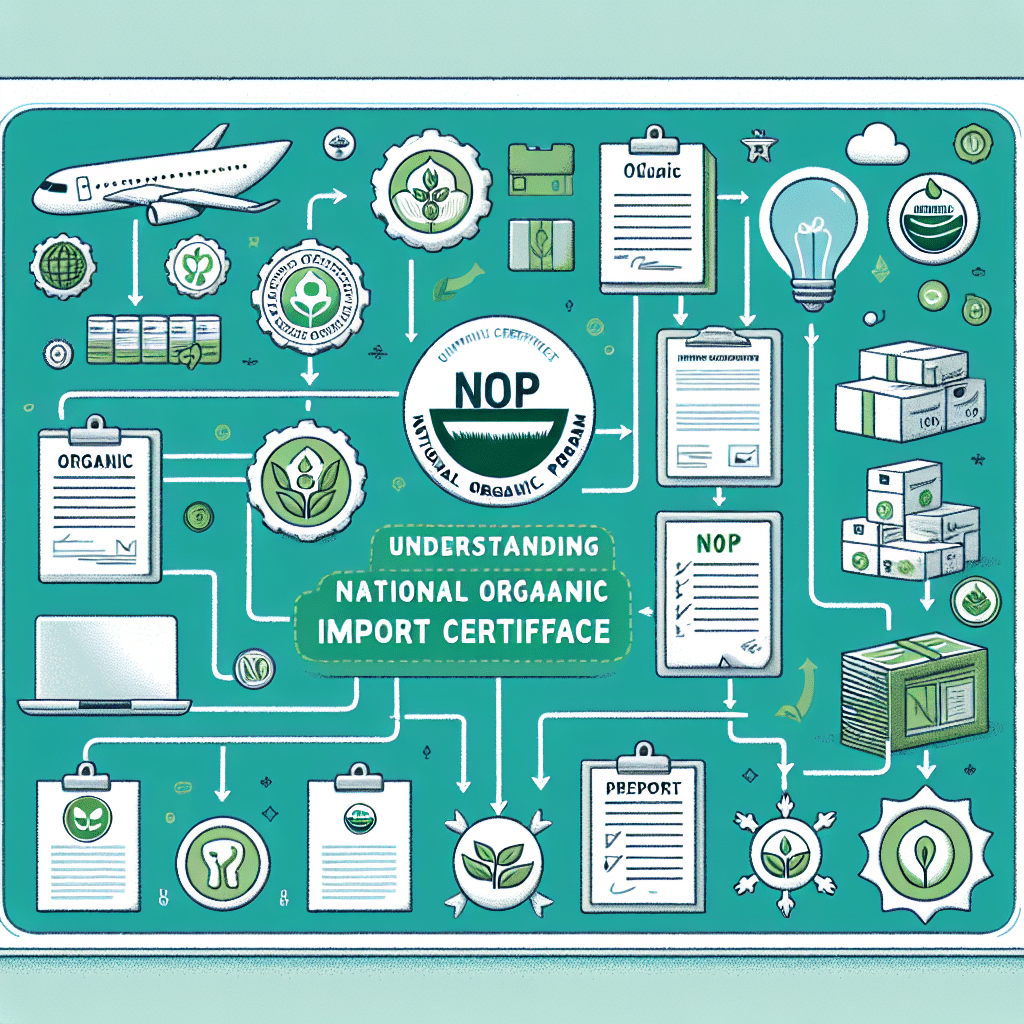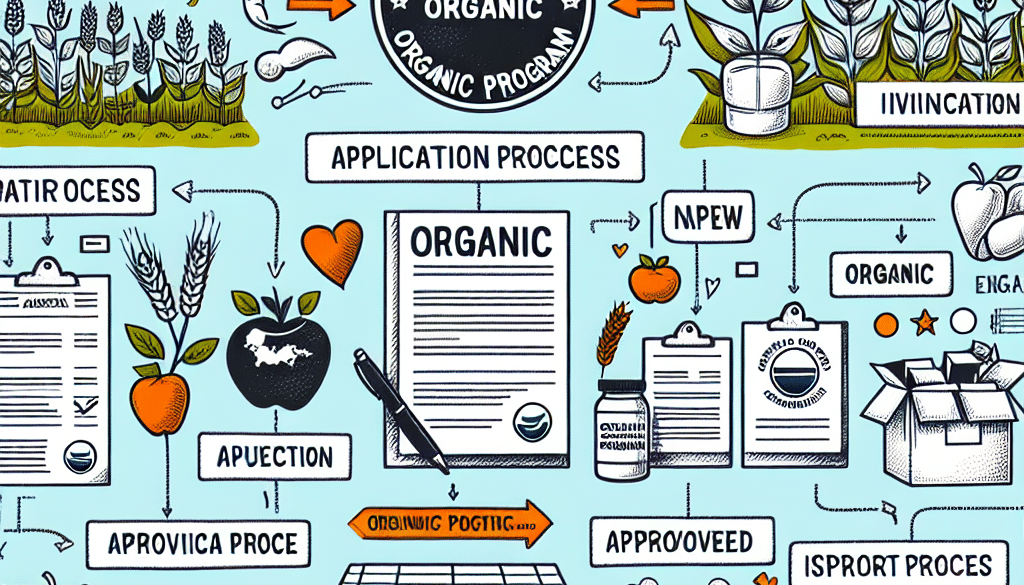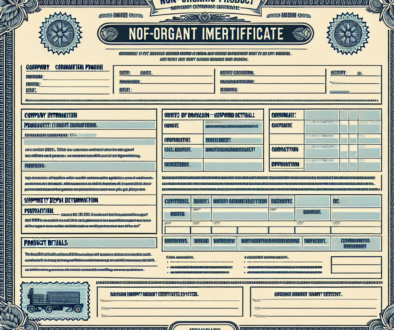Understanding Nop Import Certificate: Your Complete Guide
-
Table of Contents
- Understanding Nop Import Certificate: Your Complete Guide
- What is the NOP Import Certificate?
- Why is the NOP Import Certificate Important?
- How to Obtain an NOP Import Certificate
- Case Studies and Examples
- Statistics and Market Trends
- Challenges and Considerations
- Conclusion: Key Takeaways
- ETprotein: Your Partner for Organic Protein Products
Understanding Nop Import Certificate: Your Complete Guide

The global market for organic products has been growing steadily, with consumers increasingly seeking out healthier and more sustainable options. For businesses looking to import organic products into the United States, understanding the National Organic Program (NOP) Import Certificate is crucial. This comprehensive guide will delve into what the NOP Import Certificate is, why it’s important, and how to obtain one, ensuring your business complies with the necessary regulations to successfully import organic goods.
What is the NOP Import Certificate?
The NOP Import Certificate is a document required by the United States Department of Agriculture (USDA) for any organic products entering the U.S. It serves as proof that the imported goods comply with the USDA’s organic standards, which are among the most stringent in the world. The certificate is part of the USDA’s National Organic Program, which regulates all organic agricultural products sold, labeled, or represented as organic in the U.S.
Why is the NOP Import Certificate Important?
Obtaining an NOP Import Certificate is essential for several reasons:
- Regulatory Compliance: It ensures that your imported organic products meet U.S. organic standards and are legally recognized as organic within the country.
- Market Access: It allows your products to be sold in the U.S. market, which is critical for businesses looking to expand their reach.
- Consumer Confidence: It provides assurance to consumers that the products they purchase are genuinely organic, fostering trust in your brand.
- Supply Chain Transparency: It helps maintain transparency throughout the supply chain, from the farm to the final consumer.
How to Obtain an NOP Import Certificate
Obtaining an NOP Import Certificate involves several steps, which include:
- Ensuring Compliance: Before applying for the certificate, ensure that your products and production processes comply with NOP standards.
- Accreditation: Work with a USDA-accredited certifying agent who can certify your products as organic.
- Application: Submit an application for the NOP Import Certificate to the USDA, including detailed information about your products and their origin.
- Inspection: Your production facilities may be subject to inspection by a certifying agent to verify compliance with organic standards.
- Documentation: Provide all necessary documentation, such as organic system plans and records of compliance.
- Approval: Once your application is reviewed and approved, you will receive the NOP Import Certificate, allowing you to import your organic products into the U.S.
Case Studies and Examples
Several businesses have successfully navigated the NOP certification process to import organic products into the U.S. For instance, a South American quinoa producer expanded its market by obtaining the NOP Import Certificate, which allowed them to export their organic quinoa to U.S. consumers. Similarly, an organic tea company from Asia secured the NOP Import Certificate, enabling them to supply organic teas to the U.S. market, where demand for organic beverages is on the rise.
Statistics and Market Trends
The organic food market in the U.S. has seen significant growth. According to the Organic Trade Association, sales of organic products in the U.S. surpassed $50 billion in 2019, with imports playing a vital role in meeting consumer demand. The NOP Import Certificate is a gateway for international producers to tap into this lucrative market.
Challenges and Considerations
While obtaining an NOP Import Certificate can open up opportunities, it also comes with challenges:
- Understanding Regulations: The NOP standards are complex, and understanding them fully requires time and effort.
- Cost: Certification can be costly, especially for small-scale producers.
- Time: The certification process can be lengthy, potentially delaying market entry.
- Maintaining Compliance: Continuous compliance with NOP standards is necessary to retain certification.
Conclusion: Key Takeaways
The NOP Import Certificate is a critical document for any business looking to import organic products into the U.S. It ensures regulatory compliance, market access, consumer confidence, and supply chain transparency. To obtain the certificate, businesses must ensure their products meet NOP standards, work with an accredited certifying agent, and provide thorough documentation. While the process can be challenging, the potential market access and consumer trust make it a worthwhile endeavor for businesses aiming to succeed in the organic market.
ETprotein: Your Partner for Organic Protein Products
If you’re in the market for high-quality organic protein products, ETprotein is your go-to source. With a range of organic bulk vegan proteins and L-(+)-Ergothioneine (EGT), ETprotein caters to various industries, including nutraceuticals, pharmaceuticals, cosmeceuticals, and food and beverage. Their products are non-GMO, allergen-free, and feature a neutral taste, making them ideal for a wide array of applications. Whether you’re a distributor, trader, or manufacturer, ETprotein can meet your protein needs with their extensive product range and commitment to quality.
About ETprotein:
ETprotein, a reputable protein and L-(+)-Ergothioneine (EGT) Chinese factory manufacturer and supplier, is renowned for producing, stocking, exporting, and delivering the highest quality organic bulk vegan proteins and L-(+)-Ergothioneine. They include Organic rice protein, clear rice protein, pea protein, clear pea protein, watermelon seed protein, pumpkin seed protein, sunflower seed protein, mung bean protein, peanut protein, and L-(+)-Ergothioneine EGT Pharmaceutical grade, L-(+)-Ergothioneine EGT food grade, L-(+)-Ergothioneine EGT cosmetic grade, L-(+)-Ergothioneine EGT reference grade and L-(+)-Ergothioneine EGT standard. Their offerings, characterized by a neutral taste, non-GMO, allergen-free attributes, with L-(+)-Ergothioneine purity over 98%, 99%, cater to a diverse range of industries. They serve nutraceutical, pharmaceutical, cosmeceutical, veterinary, as well as food and beverage finished product distributors, traders, and manufacturers across Europe, USA, Canada, Australia, Thailand, Japan, Korea, Brazil, and Chile, among others.
ETprotein specialization includes exporting and delivering tailor-made protein powder and finished nutritional supplements. Their extensive product range covers sectors like Food and Beverage, Sports Nutrition, Weight Management, Dietary Supplements, Health and Wellness Products, and Infant Formula, ensuring comprehensive solutions to meet all your protein needs.
As a trusted company by leading global food and beverage brands and Fortune 500 companies, ETprotein reinforces China’s reputation in the global arena. For more information or to sample their products, please contact them and email sales(at)ETprotein.com today.














